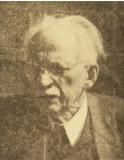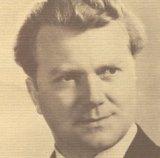
Hans Erich Pfitzner (5 May 1869 – 22 May 1949) was a German composer and self-described anti-modernist. His best known work is the post-Romantic opera Palestrina, loosely based on the life of the great sixteenth-century composer Giovanni Pierluigi da Palestrina. Born in Moscow, Russia, Pfitzner spent most of his life in Germany, working as conductor, pianist, and teacher as well as composer. Pfitzner was the son of a professional violinist and received lessons from his father when he was quite young. The family moved to Frankfurt in 1872. His earliest compositions were composed when he was 11, and in 1884 he wrote his first songs. From 1886 to 1890 he studied composition with Iwan Knorr and piano with James Kwast at the Hoch Conservatory in Frankfurt. He taught at the Koblenz Conservatory from 1892 to 1893. In 1894 he was appointed conductor at the Stadttheater in Mainz.
His own music — which includes pieces in all the major genres except the symphonic poem — was respected by contemporaries such as Gustav Mahler and Richard Strauss, although neither man cared much for Pfitzner's innately acerbic manner (and Alma Mahler reciprocated his adoration with contempt). Particularly notable are Pfitzner's numerous and delicate lieder, influenced by Hugo Wolf, yet with their own rather melancholy charm. (Several of them were recorded during the 1930s by the distinguished baritone Gerhard Hüsch, with the composer at the piano.) His first symphony - the Symphony in C minor - underwent a strange genesis: it was not conceived in orchestral terms at all, but was a reworking of a string quartet.
Pfitzner's magnum opus was his opera Palestrina, which had its premiere in Munich on 12 June 1917 under the baton of Bruno Walter. On the day before he died in February 1962, Walter dictated his last letter, which ended "Despite all the dark experiences of today I am still confident that Palestrina will remain. The work has all the elements of immortality". Easily the most celebrated of Pfitzner's prose utterances is his pamphlet Futuristengefahr ("Danger of Futurists"), written in response to Ferruccio Busoni's Sketch for a New Aesthetic of Music. "Busoni," Pfitzner complained, "places all his hopes for Western music in the future and understands the present and past as a faltering beginning, as the preparation. But what if it were otherwise? What if we find ourselves presently at a high point, or even that we have already passed beyond it?" Also related is the debate between Pfitzner and Paul Bekker.
Pfitzner dedicated his Violin Concerto in B minor, Op. 34 (1923) to the Australian violinist Alma Moodie. She premiered it in Nuremberg on 4 June 1924, with the composer conducting. Moodie became its leading exponent, and performed it over 50 times in Germany with conductors such as Pfitzner, Wilhelm Furtwängler, Hans Knappertsbusch, Hermann Scherchen, Karl Muck, Carl Schuricht, and Fritz Busch. At that time, the Pfitzner concerto was considered the most important addition to the violin concerto repertoire since the first concerto of Max Bruch, although it is not played by most violinists these days. Increasingly nationalistic in his middle and old age, Pfitzner was at first regarded sympathetically by important figures in the Third Reich (in particular by Hans Frank, with whom he remained on good terms). But he soon fell out with chief Nazis, who were unimpressed by his long musical association with the conductor Bruno Walter, who was Jewish. He incurred extra odium by refusing to obey the regime's request to provide incidental music to Shakespeare's A Midsummer Night's Dream that could be used in place of the famous score by Felix Mendelssohn, which was unacceptable to the Nazis because of his Jewish background. Pfitzner maintained that Mendelssohn's original was far better than anything he himself could offer as a substitute.
His home having been destroyed in the war and his membership in the Munich Academy of Music having been revoked for his speaking out against Nazism, Pfitzner was left mentally ill and homeless, but after the war he was denazified, a pension was established, performance bans were lifted, and a residence was procured at an old people's home in Salzburg, Austria, where he died. (Wilhelm Furtwängler conducted a performance of Pfitzner's Symphony in C major, at the Salzburg Festival with the Vienna Philharmonic Orchestra in the summer of 1949, just after the composer's death.) Following long neglect, Pfitzner's music began to reappear in opera houses and concert halls, as well as recording studios, during the 1990s.

Gerhard Heinrich Wilhelm Fritz Hüsch (Hanover, February 2, 1901 - Munich, November 23, 1984) was one of the most important German singers of modern times. He specialized in Lieder, and to a lesser extent in opera.
Between 1925 and 1942, Hüsch sang regularly at several German (as well as British and Italian) opera houses, primarily in Berlin from 1930 onwards. The role for which he is best remembered is that of Papageno in Mozart's The Magic Flute, but his repertoire included most of the standard lighter baritone roles, including Wagner's (he appeared at Bayreuth, most notably as Wolfram in Tannhäuser) and Richard Strauss's (he appeared in the premiere of Strauss's Intermezzo). Lacking the vocal amplitude of his contemporaries Hans Hotter and Gottlob Frick, Hüsch concentrated on beautifully lucid diction and an unfailingly smooth vocal line.
Nowhere were these qualities better displayed than in his pioneering pre-war Lieder records. Here he shows the art which conceals art. He performed the first more-or-less-uncut versions of Schubert's Winterreise and Die Schöne Müllerin song-cycles, and Beethoven's An die Ferne Geliebte; his discs of songs by Hugo Wolf, made under Walter Legge's auspices, helped introduce that composer to thousands of music-lovers previously unfamiliar with Wolf's output; and he released a generous selection of songs by Hans Pfitzner, these recordings bearing the imprimatur of Pfitzner himself at the piano. The obscure Finnish composer Yrjö Kilpinen found in Hüsch a steadfast champion. Sometimes Hüsch performed in choral masterpieces as well, his recorded work in this field including an exceptional Jesus in a wartime set – severely abridged – with Günther Ramin conducting, of Bach's St. Matthew Passion.
Hans Pfitzner: Lieder
Hast du von den Fischerkindern, Op.7 Nr.1
Der Gartner, Op.9 Nr.1
Die Einsame, Op.9 Nr.2
Zum Abschied meiner Tochter, Op.10 Nr.3
Michaelskirchplatz, Op.19 Nr.2
In Danzig, Op.22 Nr.1
Nachts, Op.26 Nr.2
Abbite, Op.29 Nr.1
Hussens Kerker, Op.32 Nr.1
Saerspruch, Op.32 Nr.2
Leuchtende Tage, Op.40 Nr.1
Herbstgefuhl, Op.40 Nr.4
Gerhard Hüsch, baritone Hans Pfitzner, piano
Rec.: 1930's
|

